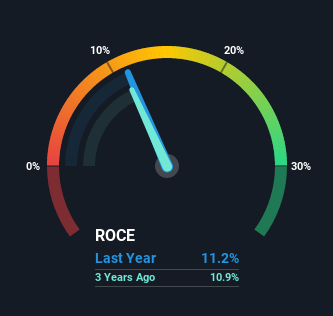- Greece
- /
- Trade Distributors
- /
- ATSE:ELTON
Here's What To Make Of Elton International Trading's (ATH:ELTON) Decelerating Rates Of Return

If you're not sure where to start when looking for the next multi-bagger, there are a few key trends you should keep an eye out for. In a perfect world, we'd like to see a company investing more capital into its business and ideally the returns earned from that capital are also increasing. Put simply, these types of businesses are compounding machines, meaning they are continually reinvesting their earnings at ever-higher rates of return. With that in mind, the ROCE of Elton International Trading (ATH:ELTON) looks decent, right now, so lets see what the trend of returns can tell us.
What is Return On Capital Employed (ROCE)?
Just to clarify if you're unsure, ROCE is a metric for evaluating how much pre-tax income (in percentage terms) a company earns on the capital invested in its business. The formula for this calculation on Elton International Trading is:
Return on Capital Employed = Earnings Before Interest and Tax (EBIT) ÷ (Total Assets - Current Liabilities)
0.11 = €7.0m ÷ (€104m - €42m) (Based on the trailing twelve months to December 2020).
Thus, Elton International Trading has an ROCE of 11%. By itself that's a normal return on capital and it's in line with the industry's average returns of 11%.
Check out our latest analysis for Elton International Trading

Historical performance is a great place to start when researching a stock so above you can see the gauge for Elton International Trading's ROCE against it's prior returns. If you're interested in investigating Elton International Trading's past further, check out this free graph of past earnings, revenue and cash flow.
How Are Returns Trending?
The trend of ROCE doesn't stand out much, but returns on a whole are decent. The company has employed 21% more capital in the last five years, and the returns on that capital have remained stable at 11%. 11% is a pretty standard return, and it provides some comfort knowing that Elton International Trading has consistently earned this amount. Stable returns in this ballpark can be unexciting, but if they can be maintained over the long run, they often provide nice rewards to shareholders.
Another thing to note, Elton International Trading has a high ratio of current liabilities to total assets of 41%. This can bring about some risks because the company is basically operating with a rather large reliance on its suppliers or other sorts of short-term creditors. While it's not necessarily a bad thing, it can be beneficial if this ratio is lower.
What We Can Learn From Elton International Trading's ROCE
The main thing to remember is that Elton International Trading has proven its ability to continually reinvest at respectable rates of return. On top of that, the stock has rewarded shareholders with a remarkable 111% return to those who've held over the last five years. So while investors seem to be recognizing these promising trends, we still believe the stock deserves further research.
Elton International Trading does have some risks, we noticed 3 warning signs (and 1 which is a bit unpleasant) we think you should know about.
While Elton International Trading may not currently earn the highest returns, we've compiled a list of companies that currently earn more than 25% return on equity. Check out this free list here.
If you’re looking to trade a wide range of investments, open an account with the lowest-cost* platform trusted by professionals, Interactive Brokers. Their clients from over 200 countries and territories trade stocks, options, futures, forex, bonds and funds worldwide from a single integrated account. Promoted
Valuation is complex, but we're here to simplify it.
Discover if Elton International Trading might be undervalued or overvalued with our detailed analysis, featuring fair value estimates, potential risks, dividends, insider trades, and its financial condition.
Access Free AnalysisThis article by Simply Wall St is general in nature. It does not constitute a recommendation to buy or sell any stock, and does not take account of your objectives, or your financial situation. We aim to bring you long-term focused analysis driven by fundamental data. Note that our analysis may not factor in the latest price-sensitive company announcements or qualitative material. Simply Wall St has no position in any stocks mentioned.
*Interactive Brokers Rated Lowest Cost Broker by StockBrokers.com Annual Online Review 2020
Have feedback on this article? Concerned about the content? Get in touch with us directly. Alternatively, email editorial-team (at) simplywallst.com.
About ATSE:ELTON
Elton International Trading
Engages in trading raw materials, additives, chemicals, and other specialized products in Greece, Romania, Turkey, Serbia, Bulgaria, and Ukraine.
Excellent balance sheet with proven track record.
Market Insights
Community Narratives




